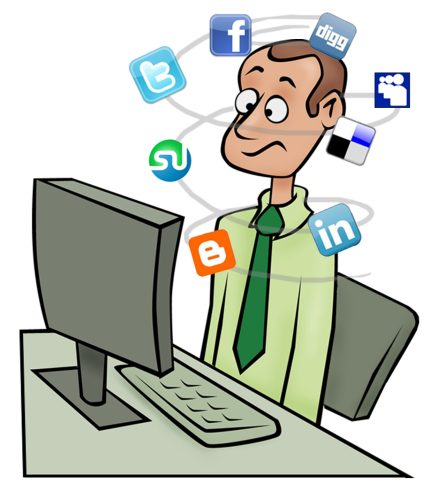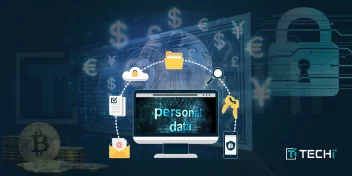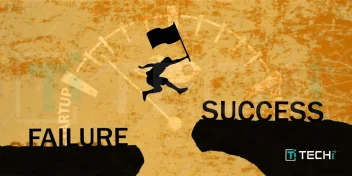It’s a trap. Yes, here comes a conspiracy theory. Get your tinfoil hats on, quickly.
Social media sites such as Facebook, Twitter, and Google+ are designed to encourage us to share information. They want us to share our lives through their networks. They want us to share what we find to be interesting whether we find it on the internet or in real life. They want us to share who our friends and family are.
They want to know everything about us.
There are two primary reasons that we are sharing way too much as a society. This could be a long, comprehensive article, but I’m going to keep it short. They say the shorter a story, the more likely it will be shared on social media sites. Yes, I’m a hypocrite.
TMI for big, medium, and little brother

Many people share very intimate details about their day-to-day lives on social media. We check in on FourSquare, take pictures and post them on Twitter, take videos and post them on Facebook, all the while thinking that these harmless little updates are not going to come back and hurt us. After all, it’s not like we’re doing anything wrong. Those images and videos are only shared privately with the close friends.
What most do not understand is that every bit of data that we post about ourselves is recorded, stored, and can (will) eventually be analyzed to determine more about us. In most cases, the reasons are relatively harmless. Most companies want to use the data for hyper-targeting of messages and advertisements. Journalists use the data to paint generalized pictures of the state of society. Breaking it down into digestible tidbits of important information is the challenge, but with a large enough data set and the right algorithms, our check-in at Shoney’s combined with our video from Westhills Mall and the plethora of other information we post can be converted into extremely accurate representations of who we are and what we do.
That’s the less-sinister aspect.
For others, whether it’s governments, spammers, hackers, or anyone else who wants the data for nefarious reasons, this data that we’re willingly allowed to be compiled will eventually be used against us. This isn’t a wild and crazy prediction. It’s going to happen. The ball is already in motion.
TMI for us to handle

On a personal level, it isn’t simply that we’re sharing too much. We’re getting too much shared to us. Most people are sticking to who and what they know – friends, relatives, old acquaintances, people we admire, and news sources. We try to keep it simple so our Twitter/Facebook/Google+ feeds don’t overwhelm us.
Unfortunately, for most there’s always going to be more people to add, more information to process, more sources to see. It’s part of our nature as we explore the relatively-new world of social media to continue to add to our feeds until it becomes to much, at which point we start to purge. Then, the process starts all over again.
The biggest challenge is that we’re all new to this. Even those who were early adopters of social media have only been on for a couple of years more than the rest of us. Because of the newness, there really isn’t a precedent that we can look to in our lives to show us how to handle social media properly. The way most people do, over-sharing and over-friending, is becoming a lesson learned by many, but there’s still so much for us to learn.
It’s the Sharepocalypse. It’s coming. How will we respond?
This
infographic tells more of the story. Click to enlarge.

 Many people share very intimate details about their day-to-day lives on social media. We check in on FourSquare, take pictures and post them on Twitter, take videos and post them on Facebook, all the while thinking that these harmless little updates are not going to come back and hurt us. After all, it’s not like we’re doing anything wrong. Those images and videos are only shared privately with the close friends.
What most do not understand is that every bit of data that we post about ourselves is recorded, stored, and can (will) eventually be analyzed to determine more about us. In most cases, the reasons are relatively harmless. Most companies want to use the data for hyper-targeting of messages and advertisements. Journalists use the data to paint generalized pictures of the state of society. Breaking it down into digestible tidbits of important information is the challenge, but with a large enough data set and the right algorithms, our check-in at Shoney’s combined with our video from Westhills Mall and the plethora of other information we post can be converted into extremely accurate representations of who we are and what we do.
That’s the less-sinister aspect.
For others, whether it’s governments, spammers, hackers, or anyone else who wants the data for nefarious reasons, this data that we’re willingly allowed to be compiled will eventually be used against us. This isn’t a wild and crazy prediction. It’s going to happen. The ball is already in motion.
Many people share very intimate details about their day-to-day lives on social media. We check in on FourSquare, take pictures and post them on Twitter, take videos and post them on Facebook, all the while thinking that these harmless little updates are not going to come back and hurt us. After all, it’s not like we’re doing anything wrong. Those images and videos are only shared privately with the close friends.
What most do not understand is that every bit of data that we post about ourselves is recorded, stored, and can (will) eventually be analyzed to determine more about us. In most cases, the reasons are relatively harmless. Most companies want to use the data for hyper-targeting of messages and advertisements. Journalists use the data to paint generalized pictures of the state of society. Breaking it down into digestible tidbits of important information is the challenge, but with a large enough data set and the right algorithms, our check-in at Shoney’s combined with our video from Westhills Mall and the plethora of other information we post can be converted into extremely accurate representations of who we are and what we do.
That’s the less-sinister aspect.
For others, whether it’s governments, spammers, hackers, or anyone else who wants the data for nefarious reasons, this data that we’re willingly allowed to be compiled will eventually be used against us. This isn’t a wild and crazy prediction. It’s going to happen. The ball is already in motion.
 On a personal level, it isn’t simply that we’re sharing too much. We’re getting too much shared to us. Most people are sticking to who and what they know – friends, relatives, old acquaintances, people we admire, and news sources. We try to keep it simple so our Twitter/Facebook/Google+ feeds don’t overwhelm us.
Unfortunately, for most there’s always going to be more people to add, more information to process, more sources to see. It’s part of our nature as we explore the relatively-new world of social media to continue to add to our feeds until it becomes to much, at which point we start to purge. Then, the process starts all over again.
The biggest challenge is that we’re all new to this. Even those who were early adopters of social media have only been on for a couple of years more than the rest of us. Because of the newness, there really isn’t a precedent that we can look to in our lives to show us how to handle social media properly. The way most people do, over-sharing and over-friending, is becoming a lesson learned by many, but there’s still so much for us to learn.
It’s the Sharepocalypse. It’s coming. How will we respond?
This infographic tells more of the story. Click to enlarge.
On a personal level, it isn’t simply that we’re sharing too much. We’re getting too much shared to us. Most people are sticking to who and what they know – friends, relatives, old acquaintances, people we admire, and news sources. We try to keep it simple so our Twitter/Facebook/Google+ feeds don’t overwhelm us.
Unfortunately, for most there’s always going to be more people to add, more information to process, more sources to see. It’s part of our nature as we explore the relatively-new world of social media to continue to add to our feeds until it becomes to much, at which point we start to purge. Then, the process starts all over again.
The biggest challenge is that we’re all new to this. Even those who were early adopters of social media have only been on for a couple of years more than the rest of us. Because of the newness, there really isn’t a precedent that we can look to in our lives to show us how to handle social media properly. The way most people do, over-sharing and over-friending, is becoming a lesson learned by many, but there’s still so much for us to learn.
It’s the Sharepocalypse. It’s coming. How will we respond?
This infographic tells more of the story. Click to enlarge.





